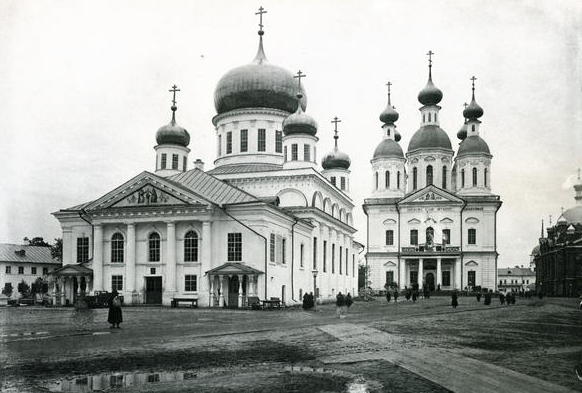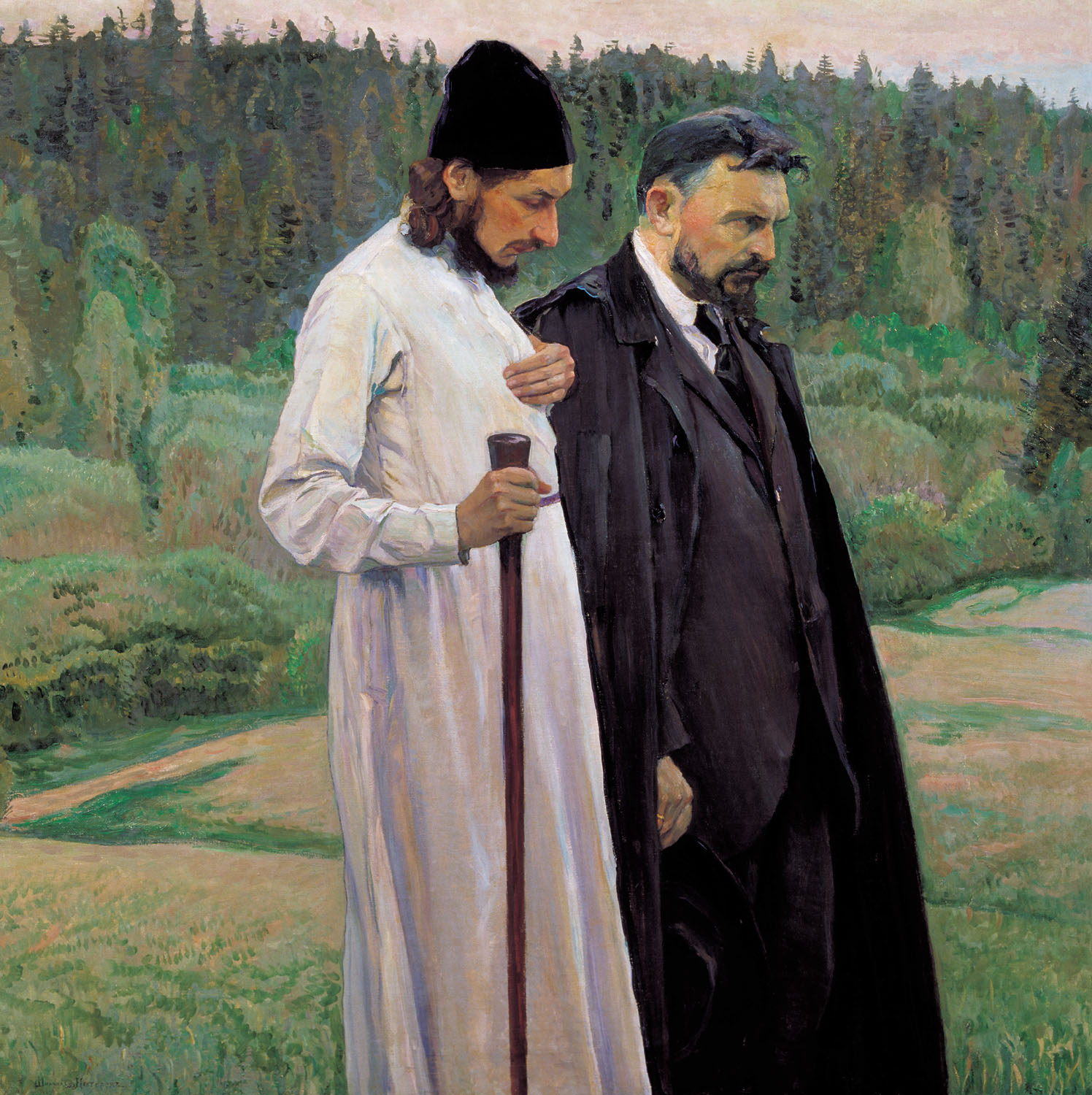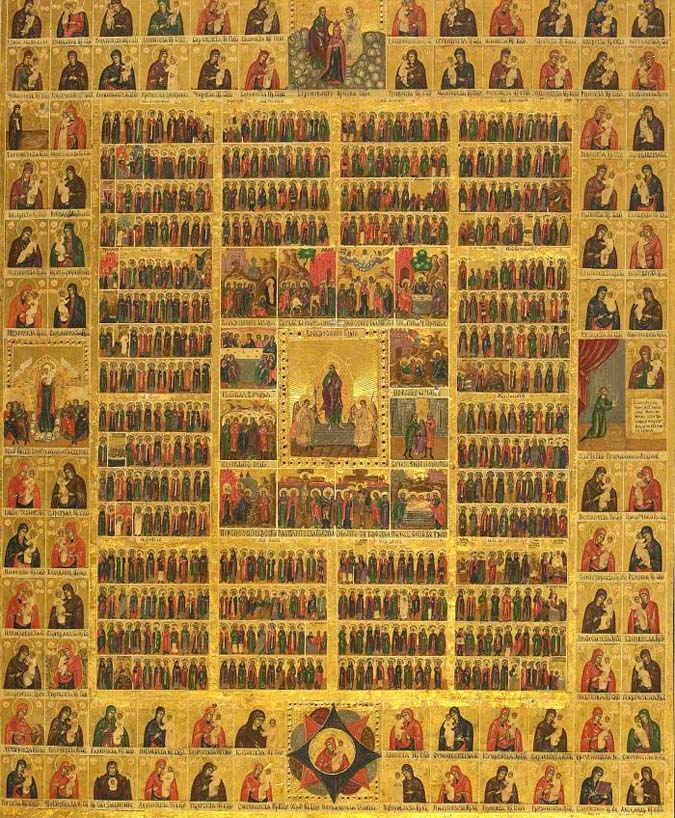|
Elder Isidore
Elder Isidore (1814–1908) was a Russian Orthodox monastic of Gethsemane Hermitage in Russia. Elder Isidore was born with the name John in Lyskov in an unknown year (estimated to be 1814). While still in the womb, his mother was told to have visited St. Seraphim of Sarov, who called her from a crowd and bowed before her, prophesying that her son would a great Ascetic.''Salt of the Earth'' by Pavel Florensky In his youth he entered Gethsemane Skete in Sarov and became a cell attendant to Archimandrite Anthony. In 1860 he took his vows and began a life of asceticism at Gethsame. Of his spiritual children, one of the most notable was Pavel Florensky, who wrote a narrative of his life after his repose called "Salt of the Earth". Elder Isidore died of natural causes in 1908. References {{DEFAULTSORT:Isidore, Elder Russian Orthodox monks 1814 births 1908 deaths 19th-century Christian monks Monks from the Russian Empire ... [...More Info...] [...Related Items...] OR: [Wikipedia] [Google] [Baidu] |
Russians
, native_name_lang = ru , image = , caption = , population = , popplace = 118 million Russians in the Russian Federation (2002 ''Winkler Prins'' estimate) , region1 = , pop1 = approx. 7,500,000 (including Russian Jews and Russian Germans) , ref1 = , region2 = , pop2 = 7,170,000 (2018) ''including Crimea'' , ref2 = , region3 = , pop3 = 3,512,925 (2020) , ref3 = , region4 = , pop4 = 3,072,756 (2009)(including Russian Jews and Russian Germans) , ref4 = , region5 = , pop5 = 1,800,000 (2010)(Russian ancestry and Russian Germans and Jews) , ref5 = 35,000 (2018)(born in Russia) , region6 = , pop6 = 938,500 (2011)(including Russian Jews) , ref6 = , region7 = , pop7 = 809,530 (2019) , ref7 ... [...More Info...] [...Related Items...] OR: [Wikipedia] [Google] [Baidu] |
Russian Orthodox Church
, native_name_lang = ru , image = Moscow July 2011-7a.jpg , imagewidth = , alt = , caption = Cathedral of Christ the Saviour in Moscow, Russia , abbreviation = ROC , type = , main_classification = Eastern Orthodox , orientation = Russian Orthodoxy , scripture = Elizabeth Bible ( Church Slavonic) Synodal Bible (Russian) , theology = Eastern Orthodox theology , polity = Episcopal , governance = Holy Synod of the Russian Orthodox Church , structure = Communion , leader_title = , leader_name = , leader_title1 = Primate , leader_name1 = Patriarch Kirill of Moscow , leader_title2 = , leader_name2 = , leader_title3 = Bishops , leader_name3 = 382 (2019) , fellowships_type = Clergy , fellowships = 40,514 full-time clerics, including 35,677 presbyters and 4,837 de ... [...More Info...] [...Related Items...] OR: [Wikipedia] [Google] [Baidu] |
Monasticism
Monasticism (from Ancient Greek , , from , , 'alone'), also referred to as monachism, or monkhood, is a religious way of life in which one renounces worldly pursuits to devote oneself fully to spiritual work. Monastic life plays an important role in many Christian churches, especially in the Catholic and Orthodox traditions as well as in other faiths such as Buddhism, Hinduism and Jainism. In other religions monasticism is criticized and not practiced, as in Islam and Zoroastrianism, or plays a marginal role, as in modern Judaism. Many monastics live in abbeys, convents, monasteries or priories to separate themselves from the secular world, unless they are in mendicant or missionary orders. Buddhism The Sangha or community of ordained Buddhist bhikkhus ("beggar" or "one who lives by alms".) and original bhikkhunis (nuns) was founded by Gautama Buddha during his lifetime over 2500 years ago. This communal monastic lifestyle grew out of the lifestyle of earlier sects of wander ... [...More Info...] [...Related Items...] OR: [Wikipedia] [Google] [Baidu] |
Asceticism
Asceticism (; from the el, ἄσκησις, áskesis, exercise', 'training) is a lifestyle characterized by abstinence from sensual pleasures, often for the purpose of pursuing spiritual goals. Ascetics may withdraw from the world for their practices or continue to be part of their society, but typically adopt a frugal lifestyle, characterised by the renunciation of material possessions and physical pleasures, and also spend time fasting while concentrating on the practice of religion or reflection upon spiritual matters. Various individuals have also attempted an ascetic lifestyle to free themselves from addictions, some of them particular to modern life, such as money, alcohol, tobacco, drugs, entertainment, sex, food, etc. Asceticism has been historically observed in many religious traditions, including Buddhism, Jainism, Hinduism, Islam, Christianity, Judaism, Stoicism and Pythagoreanism and contemporary practices continue amongst some religious followers. The practiti ... [...More Info...] [...Related Items...] OR: [Wikipedia] [Google] [Baidu] |
Sarov
Sarov (russian: Саро́в) is a closed town in Nizhny Novgorod Oblast, Russia. It was known as Gorkiy-130 (Горький-130) and Arzamas-16 (), after a (somewhat) nearby town of Arzamas,SarovLabsCreation of Nuclear Center Arzamas-16/ref> from 1946 to 1991. Until 1995, it was known as Kremlyov/Kremlev/Kremljov (). The town is closed as it is the Russian center for nuclear research. Population: 92,047 ( 2010 Census); 87,652 ( 2002 Census) History The history of the town can be divided into two different periods. In the earlier history of Russia it was known as one of the holy places of the Russian Orthodox Church, because of its monastery, that gave Russia one of its greatest saints, St. Seraphim. Since the 1940s, it has gradually become the center for research and production of Soviet and later Russian nuclear weapons. The history of human settlement in the area around Sarov goes back at least to the 12th–13th centuries, when a large Mordvin settlement was foun ... [...More Info...] [...Related Items...] OR: [Wikipedia] [Google] [Baidu] |
Pavel Florensky
Pavel Alexandrovich Florensky (also P. A. Florenskiĭ, Florenskii, Florenskij; russian: Па́вел Алекса́ндрович Флоре́нский; hy, Պավել Ֆլորենսկի, Pavel Florenski; – December 8, 1937) was a Russian Orthodox theologian, priest, philosopher, mathematician, physicist, electrical engineer, inventor, polymath and neomartyr. Biography Early life Pavel Aleksandrovich Florensky was born on in the town of Yevlakh in Elisabethpol Governorate (in present-day western Azerbaijan) into the family of a railroad engineer, Aleksandr Florensky. His father came from a family of Russian Orthodox priests while his mother Olga (Salomia) Saparova (Saparyan, Sapharashvili) was of the Tbilisi Armenian nobility in Georgia.Natalino Valentini, (ed.) Pavel Florenskij, ''La colonna e il fondamento della verità'', San Paolo editore, 2010, p. lxxi. His maternal grandmother Sofia Paatova (Paatashvili) was from an Armenian family from Karabakh, living in Bolnisi, Ge ... [...More Info...] [...Related Items...] OR: [Wikipedia] [Google] [Baidu] |
Eastern Orthodox Liturgical Calendar
The Eastern Orthodox liturgical calendar describes and dictates the rhythm of the life of the Eastern Orthodox Church. Passages of Holy Scripture, saints and events for commemoration are associated with each date, as are many times special rules for fasting or feasting that correspond to the day of the week or time of year in relationship to the major feast days. There are two types of feasts in the Orthodox Church calendar: fixed and movable. ''Fixed feasts'' occur on the same calendar day every year, whereas ''movable feasts'' change each year. The moveable feasts are generally relative to Pascha (Easter), and so the cycle of moveable feasts is referred to as the Paschal cycle. Fixed feasts The following list of dates links only to fixed feasts of the Orthodox Church. These are the fixed ''dates''; the particular ''day'' on which that date is observed differs depending upon whether one follows the Julian Calendar (sometimes referred to as the "Old Calendar") or the Revise ... [...More Info...] [...Related Items...] OR: [Wikipedia] [Google] [Baidu] |
February 3 (Eastern Orthodox Liturgics)
February 2 (Eastern Orthodox liturgics), Feb. 2 - Eastern Orthodox liturgical calendar - February 4 (Eastern Orthodox liturgics), Feb. 4 All fixed commemorations below are observed on ''February 16'' by Eastern Orthodox Churches on the Julian Calendar, Old Calendar. For February 3rd, Orthodox Churches on the Old Calendar commemorate the Saints listed on January 21 (Eastern Orthodox liturgics), January 21. Feasts * Afterfeast of the Presentation of Jesus at the Temple, Meeting of Our Lord.February 3 / 16 Orthodox Calendar (Pravoslavie.ru). Saints * Prophet Azariah (prophet), Azariah (10th century B.C.) Συναξαριστής.[...More Info...] [...Related Items...] OR: [Wikipedia] [Google] [Baidu] |
Russian Orthodox Monks
Russian(s) refers to anything related to Russia, including: *Russians (, ''russkiye''), an ethnic group of the East Slavic peoples, primarily living in Russia and neighboring countries *Rossiyane (), Russian language term for all citizens and people of Russia, regardless of ethnicity *Russophone, Russian-speaking person (, ''russkogovoryashchy'', ''russkoyazychny'') *Russian language, the most widely spoken of the Slavic languages *Russian alphabet *Russian cuisine *Russian culture *Russian studies Russian may also refer to: *Russian dressing *''The Russians'', a book by Hedrick Smith *Russian (comics), fictional Marvel Comics supervillain from ''The Punisher'' series *Russian (solitaire), a card game * "Russians" (song), from the album ''The Dream of the Blue Turtles'' by Sting *"Russian", from the album ''Tubular Bells 2003'' by Mike Oldfield *"Russian", from the album '' '' by Caravan Palace *Nik Russian, the perpetrator of a con committed in 2002 *The South African name for a ... [...More Info...] [...Related Items...] OR: [Wikipedia] [Google] [Baidu] |
1814 Births
Events January * January 1 – War of the Sixth Coalition – The Royal Prussian Army led by Gebhard Leberecht von Blücher crosses the Rhine. * January 3 ** War of the Sixth Coalition – Siege of Cattaro: French garrison surrenders to the British after ten days of bombardment. ** War of the Sixth Coalition – Siege of Metz: Allied armies lay siege to the French city and fortress of Metz. * January 5 – Mexican War of Independence – Battle of Puruarán: Spanish Royalists defeat Mexican Rebels. * January 11 – War of the Sixth Coalition – Battle of Hoogstraten: Prussian forces under Friedrich Wilhelm Freiherr von Bülow defeat the French. * January 14 ** Treaty of Kiel: Frederick VI of Denmark cedes the Kingdom of Norway into personal union with Sweden, in exchange for west Pomerania. This marks the end of the real union of Denmark-Norway. ** War of the Sixth Coalition – Siege of Antwerp: Allied forces besiege French Ant ... [...More Info...] [...Related Items...] OR: [Wikipedia] [Google] [Baidu] |
1908 Deaths
Nineteen or 19 may refer to: * 19 (number), the natural number following 18 and preceding 20 * one of the years 19 BC, AD 19, 1919, 2019 Films * ''19'' (film), a 2001 Japanese film * ''Nineteen'' (film), a 1987 science fiction film Music * 19 (band), a Japanese pop music duo Albums * ''19'' (Adele album), 2008 * ''19'', a 2003 album by Alsou * ''19'', a 2006 album by Evan Yo * ''19'', a 2018 album by MHD * ''19'', one half of the double album ''63/19'' by Kool A.D. * ''Number Nineteen'', a 1971 album by American jazz pianist Mal Waldron * ''XIX'' (EP), a 2019 EP by 1the9 Songs * "19" (song), a 1985 song by British musician Paul Hardcastle. * "Nineteen", a song by Bad4Good from the 1992 album '' Refugee'' * "Nineteen", a song by Karma to Burn from the 2001 album ''Almost Heathen''. * "Nineteen" (song), a 2007 song by American singer Billy Ray Cyrus. * "Nineteen", a song by Tegan and Sara from the 2007 album '' The Con''. * "XIX" (song), a 2014 song by Slipk ... [...More Info...] [...Related Items...] OR: [Wikipedia] [Google] [Baidu] |
19th-century Christian Monks
The 19th (nineteenth) century began on 1 January 1801 ( MDCCCI), and ended on 31 December 1900 ( MCM). The 19th century was the ninth century of the 2nd millennium. The 19th century was characterized by vast social upheaval. Slavery was abolished in much of Europe and the Americas. The First Industrial Revolution, though it began in the late 18th century, expanding beyond its British homeland for the first time during this century, particularly remaking the economies and societies of the Low Countries, the Rhineland, Northern Italy, and the Northeastern United States. A few decades later, the Second Industrial Revolution led to ever more massive urbanization and much higher levels of productivity, profit, and prosperity, a pattern that continued into the 20th century. The Islamic gunpowder empires fell into decline and European imperialism brought much of South Asia, Southeast Asia, and almost all of Africa under colonial rule. It was also marked by the collapse of the large S ... [...More Info...] [...Related Items...] OR: [Wikipedia] [Google] [Baidu] |






